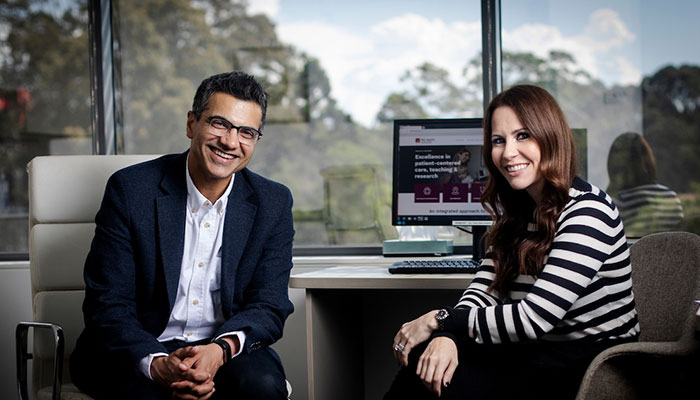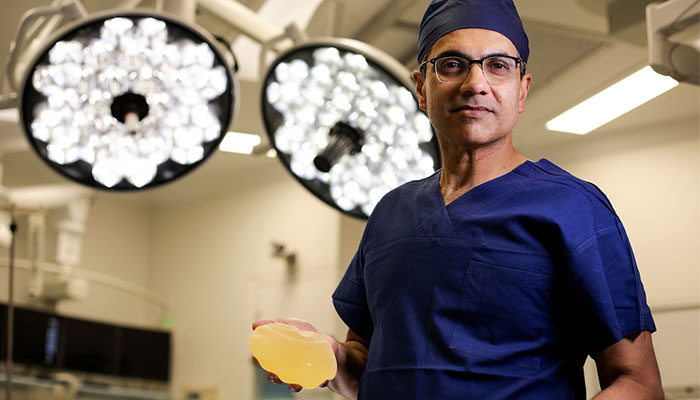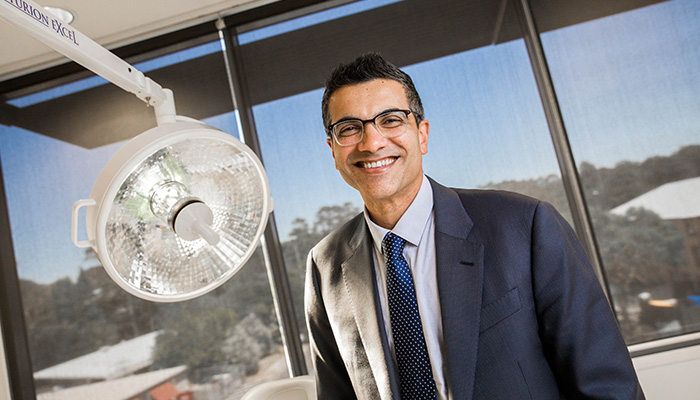It has been nearly three years since we started the world-first Breast Implant Check Clinic at Macquarie University.
Now, after seeing close to 700 patients who presented to us for routine checks of their breast and breast implants, we have found that one in five of these women will have significant symptoms, deformity and/or failure of their implants that require specialist surgical assessment and treatment.

Life-saver: Sydney mother-of-three, 34 year-old Shelly Rafferty spent four years looking for answers to what was causing a range of debilitating illnesses - when Professor Anand Deva removed her breast implants her symptoms vanished. Photo credit: Michael Amendolia.
Our findings have confirmed that the majority of women who have presented to us were not told by the doctors who inserted these implants that they needed both their implants and breasts checked regularly. This is in spite of all women in Australia being offered regular screening for breast cancer. We also found that the majority of patients had no idea of the type of implant that had been used and had not been properly informed of the medium-to-long-term risks of these devices.
Over the past three years, we have also learned much about the world of cosmetic surgery and the factors that lead young women to seek breast augmentation. It has given us a fascinating insight into some of the strategies that are used to create the growing and insatiable demand for cosmetic procedures.
Data shows around 10 years ago, about 6000 women a year in Australia had breast implants inserted, with 75 per cent for cosmetic augmentation and 25 per cent for breast reconstruction after cancer treatment. Today, the number has increased to 20,000 women a year.
In Australia cosmetic surgery is not a recognised specialist area of medical practice, and there is no officially recognised training and/or certification that makes someone a 'cosmetic surgeon'
This rise has coincided with the growth of advertising and use of social media to market this procedure and the establishment (and recent demise) of cheap breast implant clinics that offer cut price surgery. Commercial forces have always shaped this industry, but the danger is these forces are putting unsuspecting patients at risk.
Historically, advertising of medical or surgical services by doctors in Australia has been heavily legislated. When my father began practicing as a GP in the 1970s, he was only allowed to have a single line entry in the White Pages listing his name, address and telephone number.
In 1994 the Australian Competition and Consumer Commission (ACCC) allowed doctors to advertise their services, initially through print in the yellow pages and then subsequently onto other media platforms such as radio and television. This led to an explosion in both the amount and extent of medical advertising that targets consumers directly.
Turbo-charged sales tactics
While there have been a number of attempts to reign in content and appropriateness through national guidelines, there is little evidence that these are adhered to. A recent study in the UK found only 41 per cent of medical websites complied with published guidelines, with 34 per cent of advertisements for breast augmentation containing (deliberately) false and/or misleading information including minimising risk and down time after surgery.
The study also noted frequent exaggerated claims such as “a true artist”, “one of the top doctors”, “prescribing the power to be beautiful”, “kissable lips, just a click away”. The advent of social media, more recently, has turbo-charged the use of sales and marketing tactics and opened up a wide range of opportunities to specifically target individuals and build brand awareness in the cosmetic surgery industry.

Implant illness: Professor Anand Deva removes women's implants every week, as mounting evidence shows that removal alleviates symptoms being experienced by recipients. Photo credit: Michael Amendolia.
The title “cosmetic surgeon” and the specialty of “cosmetic surgery” has added to further confusion in the minds of patients and is another important factor in preventing proper regulation and establishment of minimum standards of safety and quality in this space. In Australia, cosmetic surgery is not a recognised specialist area of medical practice, and there is no officially recognised training and/or certification that makes someone a “cosmetic surgeon”.
Furthermore, the title “Cosmetic Surgeon” is not backed by the rigorous selection, training and attaining of competence that is part and parcel of all other areas of surgical practice. You simply could not have a general practitioner operate to remove a brain tumour, because our medical regulator, the Australian Health Practitioner Regulation Agency (AHPRA), and our hospitals would not accredit such a doctor to perform this procedure in the first place.
Not so for cosmetic surgery – any doctor with a basic medical degree could insert a breast implant and could, up until recently, do this procedure in his/her back office. It is vital that any patient undergoing an invasive cosmetic surgical procedure has the assurance that the doctor performing that procedure has a recognized and sufficient level of skill to safely and appropriately carry out this procedure and provide aftercare and that such an invasive procedure be performed in a licensed and accredited facility. Our regulator ensures this for every other area of medicine, except for cosmetic surgery as the field of cosmetic surgery, in their minds, does not exist, and therefore does not fall within their regulatory framework.
Discounts luring patients
What we have also learned from our patients is that they have been lured by a wide range of marketing strategies to entice them to sign up for surgery. Here are some of the things we have heard:
“He told me that he had been doing this for years and was trained by the best.”
“He told me that the procedure was simple and that he had done thousands.”
“His office rang me and told me that they had a late cancellation and that they could fit me in tomorrow and that they would give me a 20% discount.”
“I was offered a discount if I signed up for surgery straight away.”
“When I told them I could not afford the surgery, I was given paperwork to apply for cheap pre-approved finance.”
Additionally, we have seen many claims by “Cosmetic Surgeons” that they are true pioneers and innovators in their field, being the first or only surgeon to practice a certain technique in Australia including eponymous “lifts” and “smart” techniques. Innovation is important in medicine, but the real risk is that self-styled “new” techniques have not been properly evaluated by scientifically valid comparative studies or published in peer reviewed journals and simply do not have good evidence to back their claims.
What can we do to reign in an industry that is hurtling out of control? We know what doesn't work, and that is self-regulation.
We also found many patients relied essentially on social media to find their “ideal” cosmetic surgeon, often relying on online reviews to make their selection. It is a dangerous and unregulated area and borrows on the wider commercial drivers common to other sales-driven industries.
Recent reports of deliberate censoring of poor reviews, paying patients and/or staff to post glowing endorsements and paying third party “cosmetic surgery forums” to promote a particular practice casts doubt over the independence and veracity of online information that patients use in good faith to make their choice. Unlike traditional media, such as television, print and radio, social media lacks the checks and balances and vetting by journalists and broadcasters who moderate and sense-check what gets promoted to the public. A quick look through brand building manuals shows that much of what is displayed seeks to build a cult of celebrity, followers and pre-eminence through flooding these platforms with highly sexualized images, music videos and luxury products.
Smoke and mirrors
Many cosmetic surgeons now have Instagram accounts which display pre and post-operative results of procedures performed by the surgeon such as breast augmentation, liposuction, and Brazilian butt lifts (BBL). The use of lighting, poses, make-up and no clear timeline on when the post-operative photo was taken too often makes it difficult to appreciate what is actually achieved by the procedure and whether this is a consistent and reproducible result.
It can also contribute to building unrealistic expectations about the likely outcomes of the cosmetic procedure. The images are very often highly curated and capture a single time point on the patient’s journey, usually taken at the time that patient looks their best. Any result looks fantastic at six weeks with an overlay of swelling.What can we do to reign in an industry that is hurtling out of control? We know what doesn't work, and that is self-regulation.

Sorting truth from style: Lighting, filters, poses, make-up and vague information on post-surgery recovery time in photos makes it difficult for social media followers of cosmetic surgery accounts to know what is real and what has been highly styled.
The final concern about social media is the rise of influencer marketing. This involves endorsement of a product or service by a person with a large following or a high public profile in exchange for reduced or no cost access to cosmetic surgery. Recent moves to delineate sponsored content have been introduced but there is sufficient opacity here so that many incentives remain hidden. This type of marketing is often successful because it appears to be organic and may seem to reflect the influencer’s genuine assessment of the service they received. The strategy has been employed widely by most sales driven industries but is now also being employed to promote cosmetic surgery, with social media personalities flaunting the results of procedures they have undergone and publicly crediting the doctors who performed them.
From what we have learned from our patients, and the sad consequences of real physical, emotional and financial harm that they have suffered, the question remains – what can we do to reign in an industry that is hurtling out of control? We know clearly what doesn’t work, and that is self-regulation. Guidelines alone, without any means of monitoring compliance and no real penalties for transgression have achieved nothing. The lure of profit in this commercially driven space too often trumps ethics, standards and safety. There is also a pressure to keep up with the others who are pushing the envelope and finding new and better ways of attracting attention and consequently generating the constant fear of a drop in patient flow and revenue.
- UV-detecting Sun Watch a step closer to saving lives
- World first: Study confirms mistaken identity may explain why sharks bite humans
Lasting reform should firstly be focused on patients and educating them on how best to navigate this complex space. It is, after all, the choice and power of an informed and educated patient that will call out both regulatory failure and commercially driven business models to account.
Empowering the patient through shared decision making, informed educated consent and allowing time and space for them to truly understand the risks and benefits of an intended elective cosmetic surgery procedure is a good place to start. Mandatory cooling off periods prior to committing to a procedure is something that can be put into place immediately.
Secondly, tighter regulation around the marketing and advertising of cosmetic procedures is needed. Such regulation should set clear boundaries and include what is acceptable and what is not. Furthermore, there should be prohibition of the use of false or misleading information in advertising material and transparency in declaring commercial interests, in particular what incentives are given to high profile personalities for publicly endorsing a medical or surgical procedure. These regulations should be matched with equally strict penalties for any breach. Finally, it is necessary to establish, standardize and regulate a clear and replicable training pathway for credentialing of doctors to perform cosmetic procedures.
A fellowship of the Royal Australasian College of Surgeon (FRACS) guarantees that a practitioner has been trained and certified in safely performing surgical procedures and should be the minimum entry point. More specifically FRACS specialist surgeons in Plastic & Reconstructive Surgery, Otolaryngology, Urology and General Surgery have further training and competency in performing cosmetic surgery procedures as part of their specialist training. Members of the Australian Society of Plastic Surgery and the Australian Society of Aesthetic Plastic Surgery undergo continuing practice development in Cosmetic Surgery, engage in research and innovation and advocate ethical and safe practice in this area. Ultimately, clarity and restrictions around titling and certification will enable patients to be confident that the doctor performing their procedure has the skillset to achieve the best outcomes, as well as keeping them safe before, during and after their operation.
Knowlege is power - a guide to navigating the cosmetic surgery industry
What should you look for? | What should concern you? |
Fellowship of the Royal Australian College of Surgeons (FRACS) preferably with specialist Plastic & Reconstructive Surgery registration AHPRA registration as a specialist | Qualifications not recognized by the Australian Medical Council (AMC), AHPRA general registration |
Medically appropriate photographs with indication of timeline related to surgery | Inappropriate/sexualized imagery Stylised lifestyle and luxury branding |
Educational content (preferably referenced) regarding the benefits and risks of cosmetic procedures | Exaggeration of potential benefits, downplaying of risks and focus on positive outcomes of the cosmetic procedure |
Claims supported by clear scientific evidence (preferably referenced) | Claims with no scientific evidence |
Clear declaration of any financial conflicts and/or incentives used in advertising material | Undeclared financial interests Use of celebrities/influencers endorsing a practice or particular surgical procedure |
Track record of peer reviewed innovations, independent research grants and scientific publications | Self-proclaimed eminence |
Use of media and social media to disseminate information | Excessive use of social media for inducing or enticing patients. |
Standardised pricing with informed financial consent | Pressure sales or the offer of discounts/incentives Links to finance options and/or access to superannuation forms to pay for surgery |
Links to professional societies | Testimonials, endorsements, glowing reviews |
Professor Anand Deva, MBBS (Hons) MS FRACS, is a Plastic and Reconstructive surgeon at MQ Health and is a member of the Australian Society of Plastic Surgery and the Australian Society of Aesthetic Plastic Surgery.



